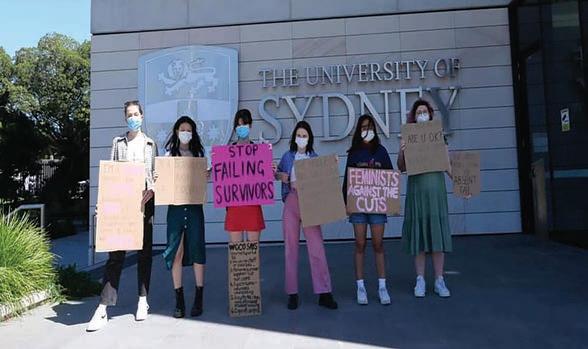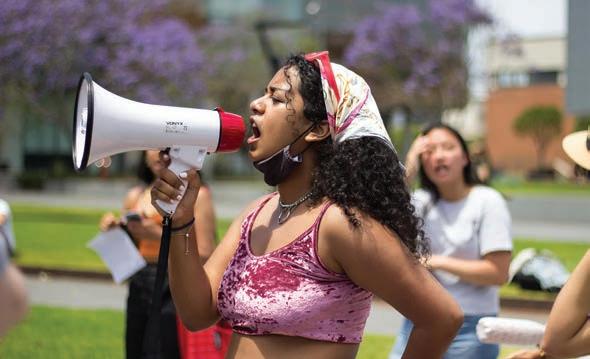
3 minute read
What is WoCo?
The Women’s Collective is a horizontal autonomous organising space for radically leftwing feminist activism. We are one of the most radical and active campus feminist collectives in the country. WoCo has organised at the University of Sydney for over 50 years, primarily focusing on activism against sexual violence on and off campus, and for abortion access and reproductive justice. We fight to free all who suffer under patriarchy.
As a collective which meets and works on the stolen land of the Gadigal people of the Eora Nation, in a colonial state of ongoing racial violence, we must centre Indigenous justice in our fight for feminist justice. WoCo fights alongside the First Nations peoples of Warrang and the many other countries that make up this land to decolonise the illegitimate settler society of so-called ‘australia’. Indigenous women are at the forefront of colonial and patriarchal violence as the fastest growing prison population in the world, and face deeply gendered state violence as mothers and community caretakers of children who are incarcerated, brutalised, or murdered by the racist police and prison systems, or stolen by the foster care system that continues the Stolen Generation to this day. First Nations women also bear the brunt of state sanctioned destruction of sacred country, such as the sacred birthing trees of the Djab Wurrung people. There is no feminist justice without Indigenous justice and decolonisation.
Advertisement
We are an unapologetically abolitionist and anticapitalist collective that fights for true liberation from police, prisons, and capitalist exploitation. It is at these intersections where the worst patriarchal violence resides. WoCo does not settle for neoliberal or reformist incremental reforms, and actively organises against carceral feminism in our fight for true liberation from patriarchy, imperialism, and capitalism.
What is carceral feminism?
Carceral feminism seeks to expand the power of police and prison systems in response to sexual violence and domestic violence. Carceral feminism seeks justice for victim-survivors in the colonial criminal system that is itself a site of gendered violence. Police are often perpetrators of violence, and prisons are inherently violent, themselves having high rates of sexual violence. A focus on punishment does not centre victimsurvivors’ healing, and ignores the underlying issues driving gendered violence.
Growing Strong WoCo is a place of activism and radical change, and an integral part of this work is community building and liberatory education. Alongside our individual pursuits of knowledge, we seek to learn and care as a communal space together. Liberation is achieved through community, and it is a community that we are building. To care for one another is a radical act.
WoCo is an autonomous collective, which means that membership and entry to meetings is open to anyone whom is not a cisgender man. Our events, however, are generally open to all.
The Women’s Collective meets weekly to discuss the current landscape of feminist issues, and to strategise and organise our activism accordingly. We host many rallies and organising events, as well as community education events such as panels, reading groups, and open discussions. This publication, Growing Strong, is put together by collective members, and shared during Welcome Week. In Semester 2 of this year, we will be editing our autonomous edition of Honi Soit. We work to build and strengthen our collective as a community and have various social events throughout the year.
Please don’t hesitate to get involved. Our main point of contact is our closed Facebook group, just answer a few short questions first!
Facebook: facebook.com/usydwoco Instagram: @usydwoco Twitter: @usydwoco Email: usydwomenscollective@gmail.com

WoCo and the university institution
The university will not stand after feminist liberation from capitalism and colonialism - this type of knowledge production and learning is far too entrenched in these systems. As feminists, we do what we can to work within them whilst also working towards more liberatory and non-hierarchical means of knowledge formation and learning. Those most affected by patriarchy are often excluded from the university and campus organising. That is, working class and Indigenous struggles are often a blind spot of campus organising, but it is these struggles which are central to the liberation of us all.












